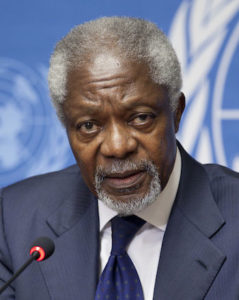
Kofi Annan
*Kofi Annan was born on this date in 1938; he was a Black Ghanaian diplomat, foundation, and international administrator.
Kofi Atta Annan was born in the Kofandros section of Kumasi on the Gold Coast (now Ghana). His twin sister Efua Atta, who died in 1991, shared the middle name Atta, which in Akan means 'twin'; his mother was Victoria Annan, and his father was Henry Reginald Annan. Annan was born into Ashanti and Fante aristocratic families; their grandfathers and uncles were tribal chiefs.
From 1954 to 1957, Annan attended the elite Mfantsipim school, a Methodist boarding school in Cape Coast founded in the 1870s. Annan said the school taught him "that suffering anywhere concerns people everywhere." In 1957, when Annan graduated from Mfantsipim, the Gold Coast gained independence from the UK and began using the name "Ghana." 1958, Annan began studying economics at the Kumasi College of Science and Technology, now the Kwame Nkrumah University of Science and Technology of Ghana.
He received a Ford Foundation grant, enabling him to complete his undergraduate studies in economics at Macalester College in St. Paul, Minnesota. In 1961. Annan then completed a diplôme d'études approfondies DEA degree in International Relations at The Graduate Institute of International and Development Studies in Geneva, Switzerland, from 1961–62. After years of work experience, he studied at the MIT Sloan School of Management (1971–72) in the Sloan Fellows program and earned a master's in management. Annan was fluent in English, French, Akan, some Kru languages, and other African languages. In 1962, Annan started working as a Budget Officer for the World Health Organization, an agency of the United Nations (UN).
In 1965, Annan married Titi Alakija; they divorced in 1983, and they had two children. In 1984, he married Nane Maria Annan, Gunnar Lagergren's daughter.
From 1974 to 1976, he worked as the Director of Tourism in Ghana. In 1980, he became the head of personnel for the UN High Commission for Refugees (UNHCR) office in Geneva. In 1983, he became the director of administrative management services at the UN Secretariat in New York. In the late 1980s, Annan was appointed Assistant Secretary-General of the UN in Human Resources, Management and Security Coordinator, Program Planning, Budget and Finance, and Controller and Peacekeeping Operations. When the UN Secretary-General established the Department of Peacekeeping Operations (DPKO) in 1992, Annan was appointed to the new department as Deputy to the then Under-Secretary-General, where he assumed the office of USG DPKO in March 1993.
He was head of peacekeeping during the battle of Somalia and the resulting collapse of the UNOSOM II peacekeeping mission and the Rwandan Genocide of 1994. In August 1995, while Boutros-Ghali was unreachable on an airplane, Annan instructed United Nations officials to "relinquish for a limited period of time their authority to veto air strikes in Bosnia." This move allowed NATO forces to conduct Operation Deliberate Force and made him a favorite of the United States. Annan served as Under-Secretary-General from March 1994 to October 1995. He was appointed a Special Representative of the Secretary-General to the former Yugoslavia, serving for five months before returning to his duties as Under-Secretary-General in April 1996.
In April 2001, Annan issued a five-point "Call to Action" to address the HIV/AIDS pandemic. Stating it was a "personal priority, Annan proposed establishing a Global AIDS and Health Fund, "dedicated to the battle against HIV/AIDS and other infectious diseases," to stimulate the increased international spending needed to help developing countries confront the HIV/AIDS crisis. For this effort, in 2001, He was awarded, along with the United Nations, the Nobel Peace Prize. In 2003, the retired Canadian General force commander of the United Nations Assistance Mission for Rwanda claimed that Annan was overly passive in his response to the imminent genocide.
In 2004, ten years after the genocide, an estimated 800,000 people were killed; Annan said, "I could and should have done more to sound the alarm and rally support." In his book Interventions: A Life in War and Peace, Annan again argued that DPKO could have made better use of the media to raise awareness of the violence in Rwanda and put pressure on governments to provide the troops necessary for an intervention. Annan explained that the events in Somalia and the collapse of the UNOSOM II mission fostered hesitation amongst UN Member states to approve robust peacekeeping operations. As a result, when the UNAMIR mission was approved just days after the battle, the resulting force lacked the troop levels, resources, and mandate to operate effectively. Kofi Annan died on August 18, 2018.